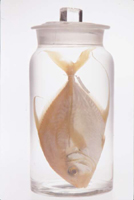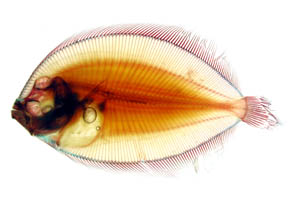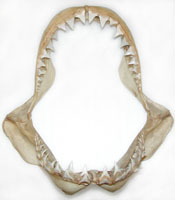


The Department of Ichthyology houses one of the largest and most important research collection of its kind in the world. There are nearly 200,000 cataloged lots (jars) containing roughly 1.2 million specimens, with many thousands of backlogged specimens still to be processed. There are representatives of nearly 11,000 nominal species of fishes in the collection, representing more than a third of those known to science. The strengths of our holdings lie principally in marine fishes of the western and central Pacific, California, and freshwater fishes from South America and southeastern Asia. Our older historic collections from North America and the large number of type specimens are of particular importance to the ichthyological community.
Although the initial preservation is done in formaldehyde, the specimens are stored in alcohol. The bulk of the collection is in 75% ethanol, while our large vats are filled with 55% isopropanol. Cleared and stained specimens (above, center) are stored in glycerine, while skeletal preparations (above, right) are stored dry.
The collection can best be thought of as a library. Instead of books there are jars of fishes. As with any library, people come to browse and select what interests them. Just as libraries loan books, the collection loans specimens. We process an average of 170 loans per year, involving roughly 6000 specimens, which are shipped to ichthyologists the world over.
The library analogy is a good one, but it breaks down in one important area. Envision a usual library where the book titles change and you have the situation in a research collection such as this. Scientific names often change as we increase our knowledge of existing species and their relationships.
Requesting Data
Contact or . Data are generally available only for non-profit scientific use. Please be as specific as possible, including what criteria to search for, what data fields you require (i.e. latitude, gear, vessel, length, etc.), and what format you'd like the data in (text delimited, Excel file, Access file, etc.)
Requesting Digital Images and Radiographs
Contact . Images are generally available only for non-profit scientific use. Please make your requests on either your institutional letterhead or e-mail address. Please be as specific as possible as to what you wish to see (i.e. full lateral, close-up dorsal, vertebral counts, fin ray counts, etc.) Requests will be done as time permits.
Requesting Loans
Contact . Loans are generally made only for non-profit scientific research. Please state exactly what material you are interested in, preferably by catalog number, and the type of material you would like. We loan wet specimens, skeletal material, cleared & stained specimens, radiographs, etc. Also please state the project for which the material is intended, using either your institutional letterhead or e-mail address. No dissections, clearing and staining, or tissue sampling may be done without prior permission. Loans to students must be made to their advisors who must assume responsibility for the materials.
Mailing Address
California Academy of Sciences
Department of Ichthyology
55 Music Concourse Dr.
San Francisco, CA 94118-4503
Specimens should be returned either by insured or registered mail. Type specimens must be hand carried or sent either by courier service or registered mail. Please contact to make the proper arrangements.
Visiting the Collection
Our collection is open to researchers, educators, and students by appointment. Please contact for day visits and tours. For longer visits please contact .
About the Department |
General information and a brief history of the Department of Ichthyology.
Ichthyology Staff |
Ichthyology curators, collection managers, curatorial assistants, and research associates.
The Catalog of Fishes |
The authoritative reference for taxonomic fish names, featuring a searchable on-line database.
Collection Database |
Search our on-line database or find out more about the collection.
Primary Types Imagebase |
Search for photographs, radiographs, and illustrations of our primary types.
Annotated Checklists |
This series serves to provide the most up-to-date taxonomic treatment of the families of recent fishes.
Funding Opportunities |
Financial aid for research in the Department of Ichthyology.
Newsletter of Systematic |
Browse past issues of the newsletter.
Contact Info |
For general inquiries about the Department of Ichthyology please contact:
Ichthyology Administrator![]() 415-379-5277
415-379-5277![]()
